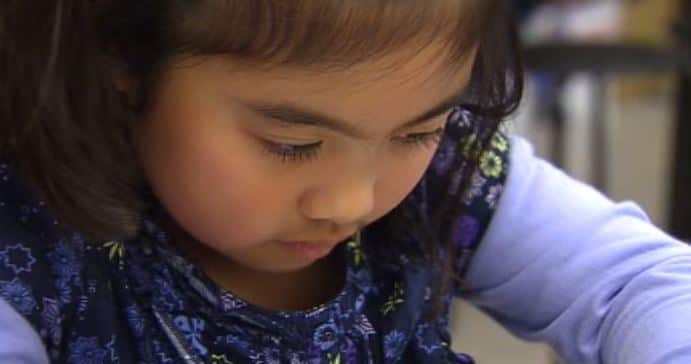Maria Zamora is seven years old. She reads chapter books and quickly solves mathematical equations.
She attends tutoring sessions at Kumon - an after school program with a strong focus on literacy on numeracy.
Her mother, Kristine Zamora came to Australia from the Philippines five years ago. She says it's important to her that her daughter gets a good education.
"If your children know how to deal with things academically, then other principles in life, other challenges in life, they would find it easier for them to handle.
“I feel very proud when there's no mistakes and it's 100 per cent right,” says Maria Zamora. Many students, like Larissa Phung, attend centres such as Kumon to improve their English after moving to Australia.
Many students, like Larissa Phung, attend centres such as Kumon to improve their English after moving to Australia.

Maria's mother says it's important that her daughter gets a good education (SBS)
Larissa, whose parents are Vietnamese, knew only a few words of English when she moved to Australia from Germany four years ago.
"When I first came to Australia I was in an ESL [English as a second language] class. But I did not just want to compete with the new migrants in the ESL class. I also wanted to succeed in other academic levels.”
Two years later, she was dux of her year, outperforming her classmates in an advanced English class.
Migrant students outperforming classmates
The latest program for International Student Assessment (or PISA) results show that first generation Australian students with migrant parents are outperforming their classmates in Maths, Science and Reading.
Students with migrant parents also scored better in reading than Australian born students with non-migrant backgrounds. Students born overseas also scored better, despite some of them having to overcome language-barriers.
"The question is one of balance, and not over-coaching and over teaching kids so they become so dependent and don't think on their own."
Mohan Dhall from the Australian Tutoring Association says a cultural attitude towards after-school study and tutoring could be a factor in the results.
"Tutoring is definitely a factor if, if you look across all the top countries, there’s a high level of tutoring in .. Taiwan, Hong Kong. And all of these countries do very well on the PISA testing."
Mr Dhall says many families with migrant backgrounds seek out tutoring or coaching to help their child gain scholarships or entry into selective schools.
However, he says, too much time working with a tutor, or picking the wrong tutor, can be counter-productive.
"The question is one of balance, and not over-coaching and over teaching kids so they become so dependent and don't think on their own"
Education 'more than just marks'
The select-entry Melbourne High School attracts students from more than 70 language backgrounds.
School Principal Jeremy Ludowyke says the school actively discourages students from using tutors, saying it can lead to dependence, and place pressure on students.
"We've had instances where a student has brought work that a tutor has set to their classroom teacher to ask for the assistance of the classroom teacher in completing that work."
Melbourne High School Maths teacher Peter Wood says he believes a good education is about more than just doing well at tests and getting good marks.
"Play sport. Play some music. Do maths really well - particularly in my class and to be a good student as well as an incredibly rounded student".
Marks may not be everything - but for students like Max Davey, who worked hard to top his state in year 12, the sky is not the limit.
"The ultimate goal for me would be to end up working in the space industry so at NASA or the European space station,” he said.
Share

